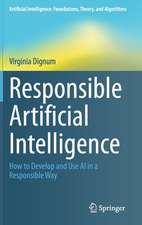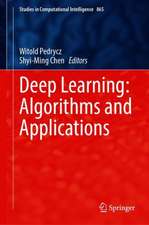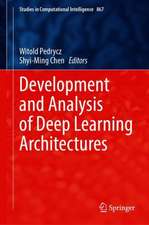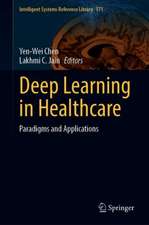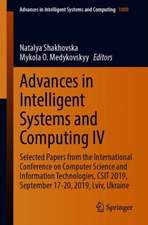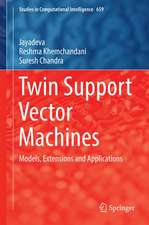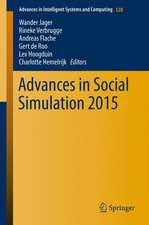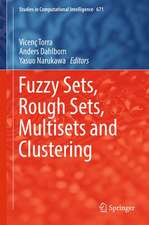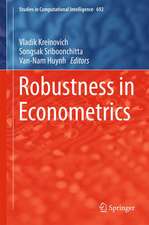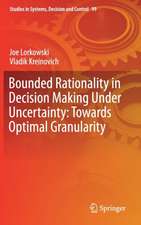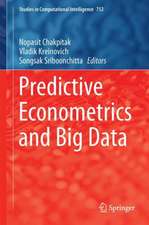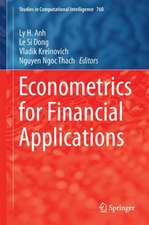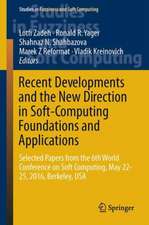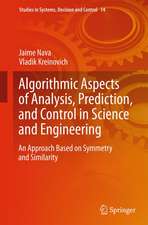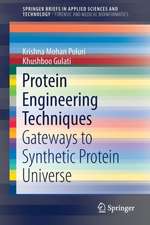Combining Interval, Probabilistic, and Other Types of Uncertainty in Engineering Applications: Studies in Computational Intelligence, cartea 773
Autor Andrew Pownuk, Vladik Kreinovichen Limba Engleză Hardback – 18 mai 2018
How can we solve engineering problems while taking into account data characterized by different types of measurement and estimation uncertainty: interval, probabilistic, fuzzy, etc.? This book provides a theoretical basis for arriving at such solutions, as well as case studies demonstrating how these theoretical ideas can be translated into practical applications in the geosciences, pavement engineering, etc.
In all these developments, the authors’ objectives were to provide accurate estimates of the resulting uncertainty; to offer solutions that require reasonably short computation times; to offer content that is accessible for engineers; and to be sufficiently general - so that readers can use the book for many different problems. The authors also describe how to make decisions under different types of uncertainty.
The book offers a valuable resource for all practical engineers interested in better ways of gauging uncertainty, for students eager to learn and apply the new techniques, and for researchers interested in processing heterogeneous uncertainty.
| Toate formatele și edițiile | Preț | Express |
|---|---|---|
| Paperback (1) | 641.49 lei 6-8 săpt. | |
| Springer International Publishing – 20 dec 2018 | 641.49 lei 6-8 săpt. | |
| Hardback (1) | 647.79 lei 6-8 săpt. | |
| Springer International Publishing – 18 mai 2018 | 647.79 lei 6-8 săpt. |
Din seria Studies in Computational Intelligence
- 20%
 Preț: 449.37 lei
Preț: 449.37 lei - 20%
 Preț: 1158.26 lei
Preț: 1158.26 lei - 20%
 Preț: 986.66 lei
Preț: 986.66 lei - 20%
 Preț: 1452.76 lei
Preț: 1452.76 lei - 20%
 Preț: 168.78 lei
Preț: 168.78 lei - 20%
 Preț: 1291.10 lei
Preț: 1291.10 lei - 18%
 Preț: 1112.30 lei
Preț: 1112.30 lei - 20%
 Preț: 565.39 lei
Preț: 565.39 lei - 20%
 Preț: 649.28 lei
Preț: 649.28 lei - 20%
 Preț: 1047.73 lei
Preț: 1047.73 lei - 20%
 Preț: 1578.96 lei
Preț: 1578.96 lei - 20%
 Preț: 643.50 lei
Preț: 643.50 lei - 20%
 Preț: 657.49 lei
Preț: 657.49 lei - 20%
 Preț: 993.28 lei
Preț: 993.28 lei - 20%
 Preț: 990.80 lei
Preț: 990.80 lei - 20%
 Preț: 989.96 lei
Preț: 989.96 lei - 20%
 Preț: 1165.69 lei
Preț: 1165.69 lei - 20%
 Preț: 1444.52 lei
Preț: 1444.52 lei - 20%
 Preț: 1041.96 lei
Preț: 1041.96 lei - 20%
 Preț: 1047.73 lei
Preț: 1047.73 lei - 20%
 Preț: 1046.06 lei
Preț: 1046.06 lei - 18%
 Preț: 2500.50 lei
Preț: 2500.50 lei - 20%
 Preț: 989.13 lei
Preț: 989.13 lei - 20%
 Preț: 1165.69 lei
Preț: 1165.69 lei - 20%
 Preț: 1164.05 lei
Preț: 1164.05 lei - 20%
 Preț: 1042.79 lei
Preț: 1042.79 lei - 20%
 Preț: 1460.19 lei
Preț: 1460.19 lei - 18%
 Preț: 1403.52 lei
Preț: 1403.52 lei - 18%
 Preț: 1124.92 lei
Preț: 1124.92 lei - 20%
 Preț: 1039.47 lei
Preț: 1039.47 lei - 20%
 Preț: 1008.11 lei
Preț: 1008.11 lei - 20%
 Preț: 1045.25 lei
Preț: 1045.25 lei - 20%
 Preț: 1275.42 lei
Preț: 1275.42 lei - 20%
 Preț: 1040.32 lei
Preț: 1040.32 lei - 20%
 Preț: 988.32 lei
Preț: 988.32 lei - 20%
 Preț: 1169.79 lei
Preț: 1169.79 lei - 20%
 Preț: 1162.37 lei
Preț: 1162.37 lei - 20%
 Preț: 1059.26 lei
Preț: 1059.26 lei - 20%
 Preț: 1164.05 lei
Preț: 1164.05 lei - 20%
 Preț: 1166.52 lei
Preț: 1166.52 lei - 20%
 Preț: 1459.38 lei
Preț: 1459.38 lei - 18%
 Preț: 1005.74 lei
Preț: 1005.74 lei - 20%
 Preț: 997.38 lei
Preț: 997.38 lei - 20%
 Preț: 1055.94 lei
Preț: 1055.94 lei - 20%
 Preț: 1284.47 lei
Preț: 1284.47 lei - 20%
 Preț: 994.08 lei
Preț: 994.08 lei - 20%
 Preț: 1048.72 lei
Preț: 1048.72 lei - 20%
 Preț: 1066.02 lei
Preț: 1066.02 lei - 20%
 Preț: 943.78 lei
Preț: 943.78 lei - 20%
 Preț: 1173.10 lei
Preț: 1173.10 lei
Preț: 647.79 lei
Preț vechi: 809.73 lei
-20% Nou
Puncte Express: 972
Preț estimativ în valută:
123.97€ • 134.61$ • 104.13£
123.97€ • 134.61$ • 104.13£
Carte tipărită la comandă
Livrare economică 22 aprilie-06 mai
Preluare comenzi: 021 569.72.76
Specificații
ISBN-13: 9783319910253
ISBN-10: 3319910256
Pagini: 202
Ilustrații: XI, 202 p. 2 illus., 1 illus. in color.
Dimensiuni: 155 x 235 mm
Greutate: 0.48 kg
Ediția:1st ed. 2018
Editura: Springer International Publishing
Colecția Springer
Seria Studies in Computational Intelligence
Locul publicării:Cham, Switzerland
ISBN-10: 3319910256
Pagini: 202
Ilustrații: XI, 202 p. 2 illus., 1 illus. in color.
Dimensiuni: 155 x 235 mm
Greutate: 0.48 kg
Ediția:1st ed. 2018
Editura: Springer International Publishing
Colecția Springer
Seria Studies in Computational Intelligence
Locul publicării:Cham, Switzerland
Cuprins
Introduction.- How to Get More Accurate Estimates.- How to Speed Up Computations.- Towards a Better Understandability of Uncertainty-Estimating Algorithms.- How General Can We Go: What Is Computable and What Is Not.- Decision Making Under Uncertainty.- Conclusions.
Recenzii
“The book is well structured and easy to work through. Without confusing detours, the authors always come directly to the point, clearly explaining what they are doing and why.” (Heinrich Hering, zbMATH 1432.93003, 2020)
Textul de pe ultima copertă
How can we solve engineering problems while taking into account data characterized by different types of measurement and estimation uncertainty: interval, probabilistic, fuzzy, etc.? This book provides a theoretical basis for arriving at such solutions, as well as case studies demonstrating how these theoretical ideas can be translated into practical applications in the geosciences, pavement engineering, etc.
In all these developments, the authors’ objectives were to provide accurate estimates of the resulting uncertainty; to offer solutions that require reasonably short computation times; to offer content that is accessible for engineers; and to be sufficiently general - so that readers can use the book for many different problems. The authors also describe how to make decisions under different types of uncertainty.
The book offers a valuable resource for all practical engineers interested in better ways of gauging uncertainty, for students eager to learn and apply the new techniques, and for researchers interested in processing heterogeneous uncertainty.
Caracteristici
Presents successful methods for estimating the accuracy of the results of data processing under different models of measurement and estimation inaccuracies: probabilistic, interval, and fuzzy Offers methods that provide accurate estimates of the resulting uncertainty, do not take too much computation time, will be accessible for engineers, and are sufficiently general to cover all kinds of uncertainty Includes several illustrative case studies


